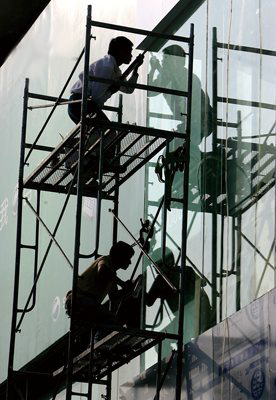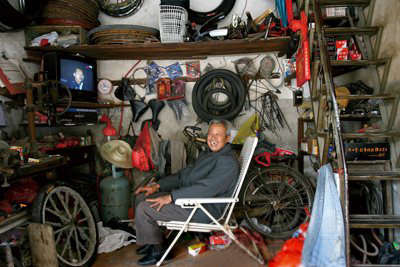What's happening to Chenggong Road? Few people can answer clearly. Most of them only remember that a lot of stores have gone out of business and more new stores have opened.
Business seems to be the eternal theme of the road. A row of discounted refrigerators stands on display in front of an electrical appliances mall. "We have to do promotions to compete with other sellers," said Chen Yongping, the owner. Located opposite from the branches of the Industrial and Commercial Bank and the Agricultural Bank, the mall building used to be the headquarters for the biggest local enterprise – Heng'an Group. At that time Chen was quite satisfied with the place.
Then Gome, China's No.1 home appliance vendor, opened a chain store on the other bank of the river. But Chen didn't worry about it because his business ideology equates doing business in Anhai Township as exchanging hearts with the local residents.
But every day free shuttle buses travel along Chenggong Road picking up customers to take them to WalMart. Even the elderly residents catch the buses to the huge supermarket for cheaper goods.
Price hike, the key word of Chenggong Road in 2007
The rent for the 60-sq meter Wenmo Bookstore is more than 7,000 yuan (US$1,000) per month. Currently rent is almost four times higher than it was ten years ago. Upcoming brand name stores have pushed up rental fees when they thronged to Chenggond Middle Road in 2004. Xiao Wenmo, the bookstore's owner, is one of the local businessmen complaining about the rent.
|

|
|
Xiao Wenmo |
Even living costs are much more than before. Last November, the price of electricity rose from 0.52 yuan (8 US cents) to 0.7 yuan (10 US cents) per kilowatt-hour, while water charges rose from 10 yuan (US$1.47) to 15 yuan (US$2.2) per ton and gas fees also doubled.
The price hike dates back to the very beginning of 2007. Nine years before that, prices remained stable. At the end of 1998, the price of pork was 16 yuan (US$2.34) per kilo; in 2006, the price increased to about 20 yuan (US$2.92) per kilo. But only a year later, prices soared up to 26 yuan (US$3.8) per kilo. Price hikes discouraged some customers and resulted in lower sales.
Compared with pork prices, Zhu Yongyuan, the Party Secretary of Anhai, said he was more familiar with house prices and the value of Heng'an stock.
Xiao Wenmo entered the stock market in September 2007. Unfortunately, he was trapped in the market. Ironically, books on finance and stock exchange become bestsellers in his bookstore.
At the beginning of 2007 four bank branches on Chenggong Road were mobbed by people rushing to invest in funds. Even the old ladies gossiped about the stock market while shopping in food markets.
Closing down, opening up and transferring
This year a new boutique is going to open on the road before the Spring Festival starts, just as a neighboring shop is dumping its stocks at a discount before closing down.
The 500-meter Chenggong Road has changed its face many times in the past decade. In 1998, the road was occupied by beauty parlors; in 2001 the lottery stalls dominated. These were soon replaced by teashops.
|

|
|
A new shop is about to open on Chenggong Road. |
The 2004 renovation brought in brand stores selling clothes and mobile phones. Among the 78 shops to the south of the road, there are currently 33 shops selling clothes and six selling mobile phones. But in 1998 all kinds of shops conducted business, ranging from hardware stores to groceries, pharmacies to snack bars.
The number of shops has declined by nearly 100, but the competition has become quite fierce.
To change or not, that's a question
Among those noisy clothing shops, there remain few "veterans" stores. Quanzhou 10418 is the only lottery stall that has survived on the road. "People are more calm and sensible over lottery tickets," said Xu Tingting, the owner. Most people now spend 10 or 20 yuan (US$1.46-2.92) on playing the lottery each time. Years ago many poured in 4,000 to 5,000 yuan (US$585-731).
The snack bar next to the lottery stall is one of the oldest shops on the road. The menu hasn't changed for almost ten years, nor has its fame and reputation among the locals. The only change is that the traditional bamboo steamers have given way to electronic steamers.
Security still troubles
Security remains troublesome on the road. In 2007, Xu had two electric bikes stolen. And Wenmo Bookstore suffered two burglaries in spite of newly installed security cameras.
Only migrants unfamiliar with the local security dare to carry a bag on the road. After 11 p.m., no local electric bike riders hang around the street for fear of robbery.
According to the local police station, in the first 11 months of 2007, a total of 1,166 criminal cases were committed within its jurisdiction, among which were 293 robberies and 602 thefts. The criminal rate rose by 5.8% as compared to the same period of the previous year. "Cracking down on robbery and theft remains a priority for this year's work agenda," said a chief police.
The police station has 49 policemen. It set up a 110 criminal report stations as early as 1996 and deploys policemen patrolling around the clock. But crimes show no sign of decline.
"Most of the robberies and thefts were committed by migrants," said Hong Rongzong, a policeman. The migrants are about half as populous as the locals. But some migrants have refuted the accusation. "The locals also committed robberies,"said a migrant driver from Henan Province. Moreover, security problems in Anhai have scared away many migrants.
The control and administration of immigration poses great pressure on the local police. The shutdown of a factory will probably cause 1,000 people to leave town.
Old people sometimes will talk about the local economy. Other similar towns have left Anhai behind in the decade during which its once outstanding toy manufacturing withered.
The most popular rumors about upturns are now related to stocks and houses.
Buying a house, not trading a house
In 2007, the first commercial housing – Hongta Residential Area – emerged in the town. Although many showed great interest in this modern residence, few were willing to buy an apartment far surpassing their incomes. "This is Anhai, not Shanghai," complained Xiao Wenmo, who had planned to buy an apartment on the 18th floor last September. The price was 5,600 yuan (US$820) per square meter, almost paralleling that in downtown Jinjiang.
In 2004 the average housing price was 1,900 yuan (US$278) to 2,000 yuan (US$293). However, the government planned to expand the town into a "city" and started demolition and construction. Hongta Residential Area was one of the newly built communities.
Due to soaring housing prices, property developers have put up advertisements for attractive low-priced houses in nearby towns.
"Buying a house is a local tradition," said Party Secretary Zhu. "Houses are not for hoarding and trading. That's what makes Anhai people different from the others."
People of Anhai
Portrait 1: Yan Chengying, 55 years old
Yan's life appears pretty static in the past decade. A head of white hair makes him looked much older than his actual age. His only entertainment is a 17-inch color TV on the table. Yan does bicycle repairs for a living. In his spare time, he reclines in a sling chair and watches TV. Although his Mandarin has improved in the last ten years, he prefers programs in his native Fujian dialect.
|

|
|
Yan Chengying |
The number of bicycles decreases year by year. Even migrant workers now ride electric bikes. Fortunately, Yan's income doesn't change much – remaining at about 1,000 yuan (US$146) per month.
During the past decade, Yan's three children have grown up and started their own families. His little girl settled down in Xiamen City in the same province, but Yan has never visited. "I would have to buy a gift for her family if I went there,"said Yan with a smile.
Thanks to his diligence and thrift, Yan built a new house in 2001. But Yan rented out the new home the following year and still lives in his old one with his wife.
Yan's expenditures remain the same as before: the same cigarettes, the same menu for lunches and 5 yuan (70 US cents) per month for haircut.
Portrait 2: Xiao Wenmo, 35 years old
Xiao's 2007 was "so-so". And looking back at the past ten years, Xiao said that no big progress had been achieved in his life. He is quite puzzled that his life hadn't become much better in tandem with the country's rapid economic development.
Xiao blamed himself for lack of investment foresight. He arrived too late to open a bookstore chain, to buy a house and to enter the stock market. Even so, he insisted on sticking with lottery investments and dreams of becoming rich overnight.
Xiao did several jobs before opening his own bookstore at the end of 1997. He likes reading business magazines and he stays finely tuned to the updated bestseller lists. Years ago, his business was threatened by pirated books and now the pressure comes from online bookstores.
Xiao dreamed of having a house of his own. Today his best news for the year 2007 was that he had a son in October.
Chronicle of Chenggong Road
1998
Huang Chengkuai, the policeman in charge of Chenggong Road, felt rather satisfied with the security for the area. Except for some 100 odd migrant workers, most of the residents were locals. Few criminal cases appeared.
More than 20 households on the road were connected to the Internet. The first Internet café opened next to the township government building.
1999
Two big crimes were committed on the road. The residents started to worry about personal safety and seldom hung around at night.
Lin Shengcai, the head of the local telecom bureau, felt depressed that the mobile business was split from the bureau; he knew his staff welfare would decline accordingly.
2000
Mushroom growth of pirated books impeded the development of Wenmo Bookstore. However, Xiao Wenmo, the owner, firmly shut his door to those illegal publications.
Chen, director of the local police station, noted that although the number of severe crimes declined compared to the previous year, the total number was climbing up. The 110-member police squad was sent out 13 times per day on average. On the busiest day, the squad was out 28 times.
2001
Xiao Wenmo was upset by the situation: the rent was 8000 yuan (US$1,170) higher than the previous year. Moreover, his other investment – a hotpot restaurant – was running with a 50,000 yuan (US$7,316) deficit.
The biggest change on the road was that scores of lottery stalls and teashops appeared.
2002
A new bookstore opened opposite the Wenmo Bookstore, exerting pressure on Xiao Wenmo. Top graded department stores stayed open for business until late at night.
2003
Xiao Wenmo opened a branch in Shoutou Township, some 10 minutes drive from Anhai Township. The branch store was ten sq meters larger than the old one.
Yangzheng Middle School, a famous school in the town, invited Wei Jinhe, one of the general designers of the spaceship "Shenzhou V" to deliver a speech to students.
2004
Business in Wenmo Bookstore was not favorable. Xiao Wenmo wondered if the reading habits of young people had changed, since more and more preferred surfing the Internet.
The woman boss was complaining about the local security. But there were police patrolling in the streets in 2004.
2005
"Nothing increased except the rent and my age," said Xiao Wenmo.
In fact, the property market in Anhai Township was far from open. Only one residence building developed by a property developer didn't reflect actual housing prices.
2006
Three bookstores together with Jinjiang Business newspaper issued a book list in order to expand brand name influence.
The fourth edition of the general development plan for Anhai Township was announced and official solicited public opinions. According to the plan, Anhai was going to be built into a development center of middle and west Jinjiang City. It was meant to be a modern industrial and trade town, a town of history and culture.
(China.org.cn by Huang Shan January 8, 2008)